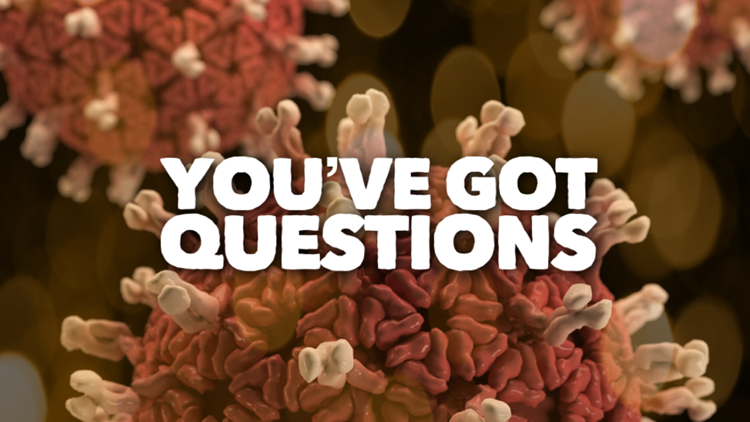CHARLOTTE, N.C. — WCNC Charlotte has listened to your questions about the COVID-19 coronavirus and we've asked them to medical professionals.
Below are 20 answers to frequently asked questions about the coronavirus.
Submit your own questions by text message to 704-329-3600. Then watch WCNC Charlotte throughout the day, including weekdays at 4:30 p.m., when medical professionals will answer some of your questions. And as always: We encourage you to seek the medical advice of your own doctor if you suspect you're sick.
Which age groups are at risk for coronavirus?
Individuals aged 65 years or older and/or any individual with existing medical conditions are at most risk for coronavirus. No one is immune to coronavirus and it can infect an individual of any age or medical condition.
Source: Dr. Ana-Maria Temple
Should I not go to work because of coronavirus?
If you're high risk and in a job where you are exposed to the public, you may consider not going to work, working from home, or working in a different capacity.
The decision should be made in consultation with your doctor and employer.
In some places, the decision may be made for you if local officials have issued a 'stay at home' order and you're considered a non-essential employee.
Source: Dr. Ana-Maria Temple
Should I wear a mask?
If you are sick, immunocompromised, have a respiratory condition, or are caring for another person, you should wear a mask. However, there is a global shortage of masks and personal protective equipment for medical personnel. If you do not need a mask, that leaves more equipment for doctors, nurses, and others on the medical front lines.
Source: Drs. Rob and Karla Robinson
What can I do to prepare for the coronavirus outbreak?
"Take care of ourselves," says Dr. Ana-Maria Temple. "The number one thing we can do is take care of our health." She explains that means sleeping properly, practicing a healthy diet, eating less junk food, pooping daily, and quitting smoking.
Source: Dr. Ana-Maria Temple
Can coronavirus spread through surfaces?
Even if you touch a surface with this virus still living on it, that doesn’t automatically make you sick. You have to touch your mouth, nose, or eyes before you wash your hands. If you touch a viral surface and then wash your hands immediately after without touching your face, it’s unlikely you’ll get the virus.
Scientists found that SARS-CoV-2, the virus that causes COVID-19, can be detected in aerosols for up to three hours and on plastic and stainless steel surfaces for up to three days.
Source: Tegna / National Institutes of Health
Can coronavirus be spread through sex?
No, the coronavirus is not a sexually transmitted disease and cannot be spread through sex.
Source: Gibbie Harris, Mecklenburg County Health Director
How should pregnant women prepare for the coronavirus?
"Women who are pregnant or expecting should take any precaution they would regularly take during a cold and flu season," said Dr. Rob Robsinon. "We might actually consider them high risk."
Data about the effects on pregnant women and newborn babies is still limited because this is a new virus. Pregnant woman typically have respiratory systems that are more susceptible because pregnancy tends to "compromise one's immunity."
Source: Drs. Rob and Karla Robinson
How long does it take to get coronavirus test results back?
This is a difficult question to answer because it depends on a variety of factors, including testing supplies, the demand at the lab, your doctor's access to a testing facility, and your location. Generally speaking, testing facilities in the United States are returning results faster than when the virus first appeared -- but it can still take anywhere from hours to days.
Source: Dr. Ana-Maria Temple
Can hospitals get additional medical supplies to treat coronavirus?
There is a generalized shortage of personal protective equipment for doctors, nurses, and other medical personnel. While new supplies are arriving, officials are encouraging everyone to stay home, stop the spread, and 'flatten the curve.' Self-isolating is intended to relieve pressure on hospitals and the medical system.
Source: WLTV / Tegna
Should neighborhood kids not play with each other during the coronavirus outbreak?
"At this time, it's best to not do small gatherings at your house," said Dr. Ana-Maria Temple. Stay at home orders issued by government officials prohibit most non-essential gatherings.
Source: Dr. Ana-Maria Temple
Is coronavirus worse than the flu?
"[Coronavirus] is so contagious because no one has antibodies to this illness," says Dr. Ana-Maria Temple. "It's never been seen before in humans so no one has developed antibodies."
Whereas the flu has been seen before and we are potentially more protected from previous exposure.
Source: Dr. Ana-Maria Temple
How are our immune systems prepare to fight the coronavirus
"People are looking for medication or the quick fix without understanding that we are equipped with an immune system that is supposed to be able to response to this," says Dr. Ana-Maria Temple, who suggests a healthy lifestyle to allow our immune system to operate at its fullest capacity.
Source: Dr. Ana-Maria Temple
Does elderberry syrup help fight the coronavirus?
Elderberry syrup can actually raise your risk of coronavirus symptoms and severity.
Source: Dr. Ana-Maria Temple
Will warm weather help stop the coronavirus?
It's too early to know, says Dr. Ana-Maria Temple. "We truly don't know," she said." In looking at influenza, we know influenza gets less [new cases]."
Source: Dr. Ana-Maria Temple
Can I go outside during the coronavirus outbreak?
Yes, and you should. Get outside. Exercise. Walk your dog. Just remember to stay socially distant and at least six feet away from others. And avoid using common equipment or facilities like a basketball court or playground.
Source: Dr. Ana-Maria Temple
Why are we being told to be socially distant and stay 6 feet away from others?
The coronavirus is spread through the air.
"When we're talking in normal conversation, spit and viral particles come out of your mouth," says Dr. Ana-Maria Temple. "When you're coughing, the force of the cough makes the virus goes longer distances."
The virus is also spread through common surfaces. The cleaning of surfaces will help prevent the spread of COVID-19.
Source: Dr. Ana-Maria Temple
How to control your anxiety during the coronavirus outbreak
"Once a day, you look at the latest updates then turn it off - and spend time with your family," says. Dr. Ana-Maria Temple.
She also recommends meditation to help clear your head.
Source: Dr. Ana-Maria Temple
Is it safe to use the mail?
Yes, but you should wipe down any packages. And remember to always wash your hands after handling materials from outside.
Source: Dr. Ana-Maria Temple
What is your best advice to handle the coronavirus outbreak?
"Enjoy your family. Enjoy this time with the less busy schedule," says Dr. Ana-Maria Temple. "Now we're forced to chill-out."
Source: Dr. Ana-Maria Temple




